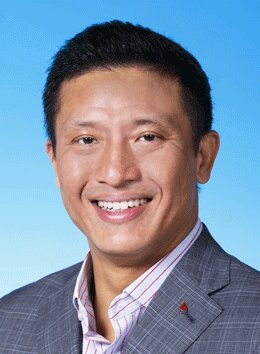Keynote Speaker Ⅰ

Prof. Michalis Matthaiou
Queen’s University Belfast, United Kingdom
IEEE Fellow
Speech Title: Cell-free massive MIMO for next generation multiple access
Abstract: The next generation multiple access (NGMA) techniques are expected to achieve massive and ubiquitous access for a large number of devices and provide high spectral efficiency in ultra-dense networks. To meet these unprecedented mobile traffic demands, a paradigm shift from the conventional cellular networks towards distributed communication systems is required. Cell-free massive multiple-input multiple-output (CF-mMIMO) is considered as a practical and scalable embodiment of the distributed/ network MIMO systems, which inherits not only the key benefits from colocated massive MIMO systems, but also the macro-diversity gain from the distributed systems. In this paper, we provide an overview of current research efforts on the CF-mMIMO systems and their promising future application scenarios. Then, we elaborate on the new requirements for CF-mMIMO networks and propose a unifying framework for NGMA based on virtual full-duplex and CF-mMIMO.
A brief introduction to Prof. Michalis Matthaiou:
Michalis Matthaiou is the Chair Professor of Communications Engineering and Signal Processing and Deputy Director of the Centre for Wireless Innovation (CWI) at Queen’s University Belfast, U.K. Dr. Matthaiou and his coauthors received the IEEE Communications Society (ComSoc) Leonard G. Abraham Prize in 2017. He currently holds the ERC Consolidator Grant BEATRICE (2021-2026) focused on the interface between information and electromagnetic theories. He was awarded the prestigious 2018/2019 Royal Academy of Engineering/The Leverhulme Trust Senior Research Fellowship and also received the 2019 EURASIP Early Career Award. His team was also the Grand Winner of the 2019 Mobile World Congress Challenge. He is currently the Editor-in-Chief of Elsevier Physical Communication, a Senior Editor for IEEE Wireless Communications Letters and IEEE Signal Processing Magazine, and an Associate Editor for IEEE Transactions on Communications. He is an IEEE Fellow.
Keynote Speaker Ⅱ

Prof. Chik Patrick Yue
The Hong Kong University of Science and Technology, China
Member of ACM, Fellow of IEEE and OSA
Speech Title: Enabling Technologies for Multi-robot Human Collaboration
A brief introduction to Prof. Chik Patrick Yue:
C. Patrick Yue (S’93–M’98–SM’05–F’15) received the BS degree in Electronic and Computer Engineering (Highest Hons.) from the University of Texas at Austin in 1992, the MS and PhD degrees in Electrical Engineering from Stanford University in 1994 and 1998, respectively. Based on his PhD thesis work, he co-founded Atheros Communications in 1998 and contributed to the development and deployment of the world's first IEEE802.11a CMOS Wi-Fi transceiver system-on-chip (SoC). In 2002, he joined Aeluros to work on CMOS high-speed PHY/SerDes IC design and signal integrity issues in chip packaging. Between 2001 and 2003, while working at the start-ups, he served as a Consulting Assistant Professor at Stanford in the EE Department focusing on research in the area of high-frequency CMOS IC design and RF device modeling. In 2003, he joined Carnegie Mellon University in Pittsburgh, PA as an Assistant Professor in the Department of Electrical and Computer Engineering. In 2006, he moved to the University of California, Santa Barbara and was promoted to full professor in 2010. Since 2011, he has been a Professor at the Hong Kong University of Science and Technology (HKUST) in the Department of Electronic and Computer Engineering. From 2014 to 2015, he served as the first Associate Provost for Knowledge Transfer at HKUST. In 2016, he took a sabbatical leave from HKUST to Tsinghua University, Beijing, PRC as a Visiting Chair Professor in the Institute of Microelectronics. In 2017, he founded LiPHY Communications to commercialize visible light communication (VLC) technology for smart building and IoT market. Currently, he is the Director of the HKUST Integrated Circuit Design Center (ICDC), the Optical Wireless Lab (OWL), and the HKUST-Qualcomm Joint Innovation and Research Lab. His research interest includes optical wireless physical layer circuits and systems, high-speed wireline communication SoC, millimeter-wave communication and sensing circuits, indoor positioning and image processing technologies for robotic applications, and edge computing accelerator design for IoT applications. Prof. Yue has contributed to more than 200 peer-reviewed articles, 20 granted patents, and 2 book chapters. He was awarded the eleventh Guanghua Engineering Science and Technology Youth Award by the Chinese Academy of Engineering (CAE) in 2016. He and his students received the IEEE International Solid-State Circuits Conference (ISSCC) Best Student Paper Award in 2003, the IEEE International Wireless Symposium (IWS) Best Student Paper Award in 2016, and the IEEE Circuits and Systems Society Outstanding Young Author Award in 2017. He has served on the technical program committees of the ISSCC, the IEEE Symposium on VLSI Circuits (VLSI-Circuits), the IEEE RFIC Symposium (RFIC), the IEEE European Solid-State Circuits Conference (ESSCIRC), the IEEE IWS, and the IEEE Asian Solid-State Circuits Conference (A-SSCC). He was an Editor for IEEE Electron Device Letters and IEEE Solid-State Circuits Magazine, and a Guest Editor for the IEEE Transactions on Microwave Theory and Techniques. Since 2018, he has been an Editor of the Proceedings of the IEEE. He was an Elected AdCom Member from 2015 to 2017 for the IEEE Solid-State Circuit Society (SSCS) and was a SSCS Distinguished Lecturer between 2017 and 2018. He served as the Vice-President of Membership of the IEEE SSCS between 2016 to 2021. Prof. Yue is a Member of ACM and a Fellow of IEEE and OSA.